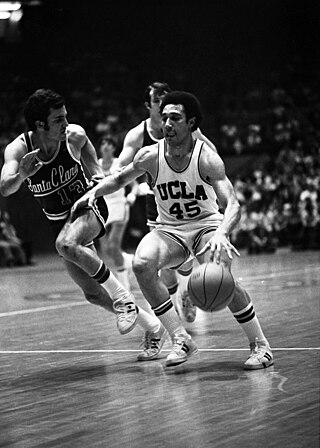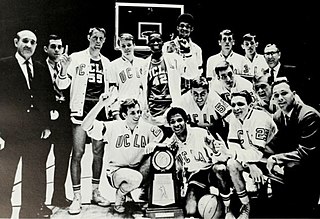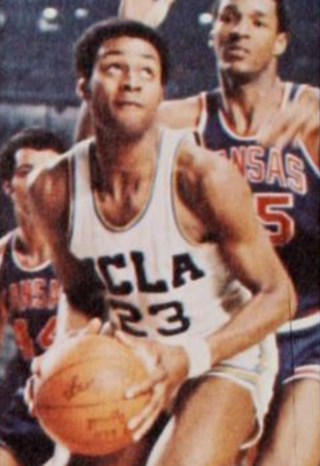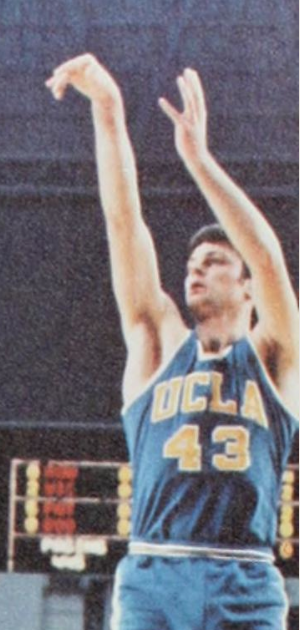
Kareem Abdul-Jabbar is an American former basketball player, considered one of the sport's greatest ever players. He played professionally for 20 seasons for the Milwaukee Bucks and Los Angeles Lakers in the National Basketball Association (NBA), and played college basketball for the UCLA Bruins as a center. Abdul-Jabbar won a record six-time NBA Most Valuable Player (MVP) awards. He was a 19-time NBA All-Star, a 15-time All-NBA Team member, and an 11-time NBA All-Defensive Team selection. He was a member of six NBA championship teams as a player and two more as an assistant coach, and was twice voted the NBA Finals MVP. He was named to three NBA anniversary teams. Widely regarded as one of the greatest players of all time, he has been called the greatest basketball player of all time by many of his contemporaries such as Pat Riley, Isiah Thomas, and Julius Erving. Abdul-Jabbar broke the NBA's career scoring record in 1984, and held it until LeBron James surpassed him in 2023.

John Robert Wooden was an American basketball coach and player. Nicknamed "the Wizard of Westwood", he won ten National Collegiate Athletic Association (NCAA) national championships in a 12-year period as head coach for the UCLA Bruins, including a record seven in a row. No other team has won more than four in a row in Division I college men's or women's basketball. Within this period, his teams won an NCAA men's basketball record 88 consecutive games. Wooden won the prestigious Henry Iba Award as national coach of the year a record seven times and won the Associated Press award five times.

Charles Henry Bibby is an American former professional basketball player who played for the New York Knicks, New Orleans Jazz, Philadelphia 76ers, and San Diego Clippers of the National Basketball Association (NBA). He also spent a season as a player-assistant coach for the Lancaster Lightning of the Continental Basketball Association (CBA).

Elvin Ernest Hayes, nicknamed "The Big E", is an American former professional basketball player and radio analyst for his alma mater Houston Cougars. He is a member of the NBA's 50th and 75th anniversary teams, and an inductee in the Naismith Memorial Basketball Hall of Fame. Known for both his offensive and defensive prowess, Hayes is often regarded as one of the best power forwards in NBA history. Hayes is also known for his longevity, being third all-time in NBA minutes played, and missing only nine games during his 16-season career.
The 1968 NCAA University Division basketball tournament involved 23 schools playing in single-elimination play to determine the national champion of men's NCAA Division I college basketball. It began on March 9, 1968, and ended with the championship game on March 23 in Los Angeles, California. A total of 27 games were played, including a third-place game in each region and a national third-place game.

In men's college basketball, the Game of the Century was a historic National Collegiate Athletic Association (NCAA) game between the Houston Cougars and the UCLA Bruins played on January 20, 1968, at the Astrodome in Houston, Texas. It was the first NCAA regular season game broadcast nationwide in prime time. It established college basketball as a sports commodity on television and paved the way for the modern "March Madness" television coverage.

Steven John Patterson was an American professional basketball player and coach who played in the National Basketball Association (NBA) for five seasons. A 6'9" center for UCLA, Patterson spent his first year of athletic eligibility as the backup to Lew Alcindor, later Kareem Abdul-Jabbar. He then was the starting center for the Bruins' 1970 and 1971 championship teams under legendary coach John Wooden.

The UCLA Bruins men's basketball program represents the University of California, Los Angeles in the sport of men's basketball as a member of the Big Ten Conference. Established in 1919, the program has won a record 11 NCAA titles. Coach John Wooden led the Bruins to 10 national titles in 12 seasons, from 1964 to 1975, including seven straight from 1967 to 1973. UCLA went undefeated a record four times. Coach Jim Harrick led the team to another NCAA title in 1995. Former coach Ben Howland led UCLA to three consecutive Final Four appearances from 2006 to 2008. As a member of the AAWU, Pacific-8 and then Pacific-10, UCLA set an NCAA Division I record with 13 consecutive regular season conference titles between 1967 and 1979 which stood until tied by Kansas in 2017. In 2024, UCLA departed the Pac-12 Conference and joined the Big Ten Conference on August 2, 2024.

The 1966–67 UCLA Bruins men's basketball team won UCLA's third NCAA national championship under head coach John Wooden with a win over Dayton. The Bruins went undefeated, winning all 30 games.

The 1967–68 UCLA Bruins men's basketball team won a second consecutive NCAA national championship, the fourth in five years under head coach John Wooden, with a win over North Carolina.
The 1968–69 UCLA Bruins men's basketball team won an unprecedented third consecutive NCAA National Basketball Championship, the fifth in six years under head coach John Wooden with a win over Purdue, coach Wooden's alma mater. The Bruins opened with 25 wins, on a 41-game winning streak, but lost the regular season finale to rival USC on March 8, which snapped a home winning streak of 85 games.
The 1965–66 UCLA Bruins men's basketball team finished the season in second place, under head coach John R. Wooden. It won the Los Angeles Classic Championship and completed the year with an 18–8 overall record.
The men's college basketball program of the University of California, Los Angeles (UCLA) was founded in 1920 and is known competitively as the UCLA Bruins. The Bruins have won 11 National Collegiate Athletic Association (NCAA) Division I national championships, the most of any school. UCLA players have been assigned jersey numbers ranging from 0 to 78 in the team's history. The school no longer issues nine retired numbers in honor of 10 former players. To qualify, a player must have been a three-time consensus All-American, a consensus national player of the year, or been inducted into the Naismith Memorial Basketball Hall of Fame. The retired numbers are displayed in the rafters of the Bruins' home arena, Pauley Pavilion. UCLA's legendary coach John Wooden generally opposed having numbers retired.

Thomas Lewis Curtis was an American college basketball player for the UCLA Bruins. He played on two undefeated national championship teams at UCLA. He did not lose a game in college until his final season, helping the school to a record 88-game consecutive win streak.

Kenneth Arnold Booker is an American former professional basketball player. He played college basketball for the UCLA Bruins from 1969 to 1971, winning a national championship in each of his two seasons of play. He played two seasons professionally in Europe.

George Terence Schofield is an American former basketball player and coach. He played college basketball with the UCLA Bruins, winning three national championships (1969–1971) under Coach John Wooden. Schofield played professionally in Germany, where he later became a basketball coach. He also became an English lecturer for a German university.

Andrew William Hill is an American former basketball player and current author and motivational speaker. He played college basketball for the UCLA Bruins, winning three national championships in the early 1970s under Coach John Wooden. After a brief career playing professionally overseas, Hill entered the entertainment industry. He became president of two media companies, CBS Productions and Channel One News. He reconnected with Wooden after 25 years, and they co-wrote a best-selling book based on the application of Wooden's coaching principles to the business world.

Jerry Norman is an American former college basketball player and coach. He was an assistant coach under John Wooden with the UCLA Bruins for 11 seasons, helping Wooden earn the first four of his record 10 national titles. He is enshrined in the UCLA Athletics Hall of Fame.

John Miles Ecker is a German-American former basketball player and coach. He played college basketball for the UCLA Bruins under Coach John Wooden, winning three straight national championships from 1969 through 1971. Ecker played and coached professionally in Germany, where he also became a naturalized citizen in 1977. He also taught at a high school in Germany.

The 1968–69 NCAA University Division men's basketball season began in December 1968, progressed through the regular season and conference tournaments, and concluded with the 1969 NCAA University Division basketball tournament championship game on March 22, 1969, at Freedom Hall in Louisville, Kentucky. The UCLA Bruins won their fifth NCAA national championship with a 92–72 victory over the Purdue Boilermakers.















